A couple builds a dreamy canvas getaway high on their Waitomo farm
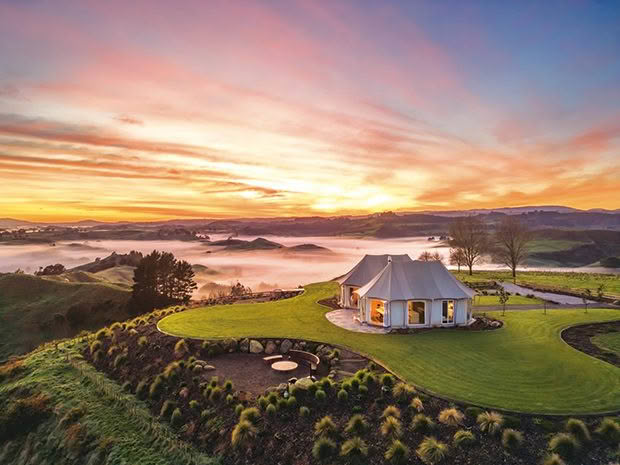
Landscaping around the Pōhutukawa tent is by Jordan Scott (no family relation) from Calla Landscapes. Originally, the couple planned to simply “plonk a few trees down. When the landscaping designer’s plans came in, things escalated.” Jordan created different areas around the tent, allowing groups to enjoy the views together, have a solo spa or find peace and quiet by the firepit.
After escaping inner-city stress for life on the farm, a Waitomo family is offering a canvas oasis for those who wish to do the same.
Words: Sarah Templeton Photos: Tessa Chrisp Drone Images: Lisa Sun
Early risers in rural Waitomo are rewarded by seeing their properties blanketed in swirling cloud-like mist. Canopies of the white stuff occur regularly here, thanks to the unique topography of sloping hills and coastal air. When Ben Scott gets out of bed to tick off his morning jobs, his farm is often thickly carpeted in ethereal-looking vapour.
The pearl-hued “clouds” have silver linings, literally and figuratively. After all, Ben and his wife Emily were once fully-fledged members of the Auckland rat race. Rather than hilltop views, the heights they strove for were career wins that, to be honest, neither wanted very much. And if it weren’t for a bovine miscalculation and subsequent financial fall, they might still be there.
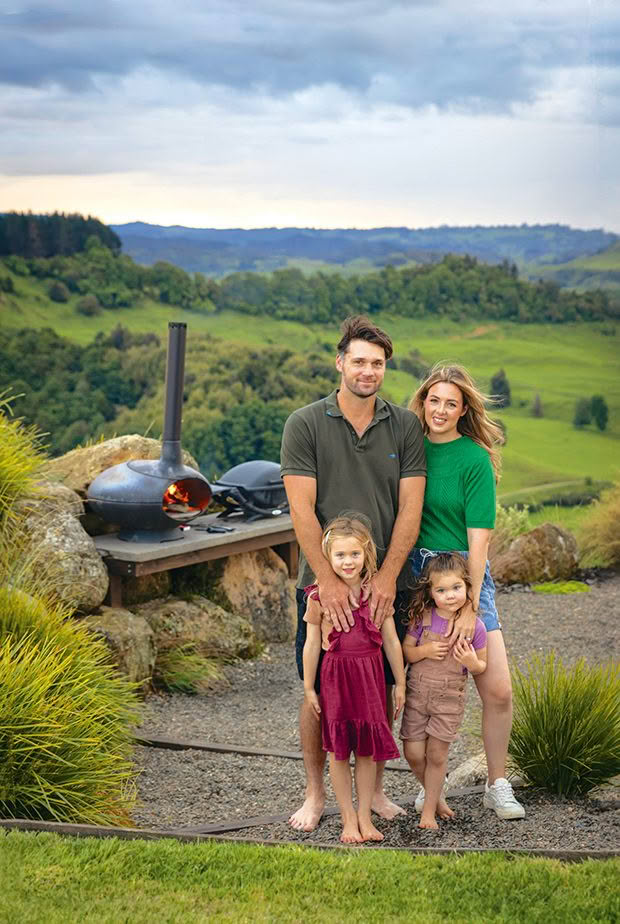
Ben and Emily with their two daughters, who are becoming “regular little farm girls” — Willow (5) and River (3).
In the mid-2010s, dairy prices were reaching a record peak. Ben, a city-based civil engineer with a head for numbers, thought he’d invest in a few cows to run on his family farm in a Waitomo paddock leased to a local dairy farmer. Say, five or 10, just to run with the herd and offer a small return.
A friend — a bank manager — was called in to run the numbers. A communication error meant he came to the couple with a proposed payout from a herd rather than a huddle: some 240 more cows than Ben’s proposed 10. “He ran the numbers — it was a time of a record milk payout — and it looked absolutely amazing,” says Emily. “So, the next minute, Ben’s got this mortgage to buy a whole herd.
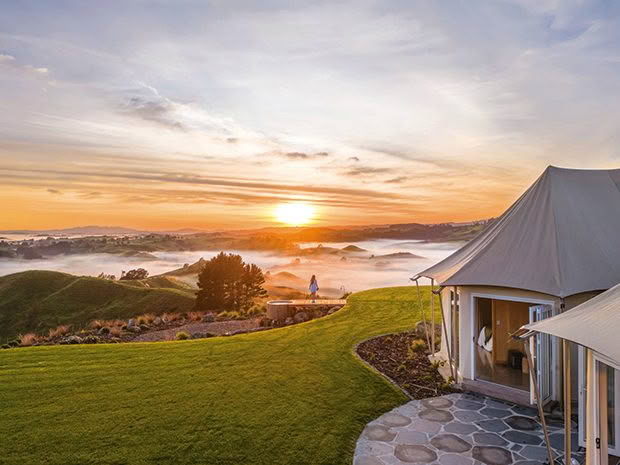
While Ben and Emily may build another Wild Canvas glampsite elsewhere in the country, they’re leaving the remaining hills of the farm untouched. The beauty of theirs, they say, is that guests can’t see another human for kilometres — an appealing concept for stressed-out city slickers.
“Obviously, in hindsight, you never buy in a peak.”
With all highs come falls. The following year, the price plummeted — but the cows were settled in their new home. “And that meant we were always coming down to the farm on weekends to help with milking, farm maintenance and to save money where we could, because we weren’t really in the best position financially.”
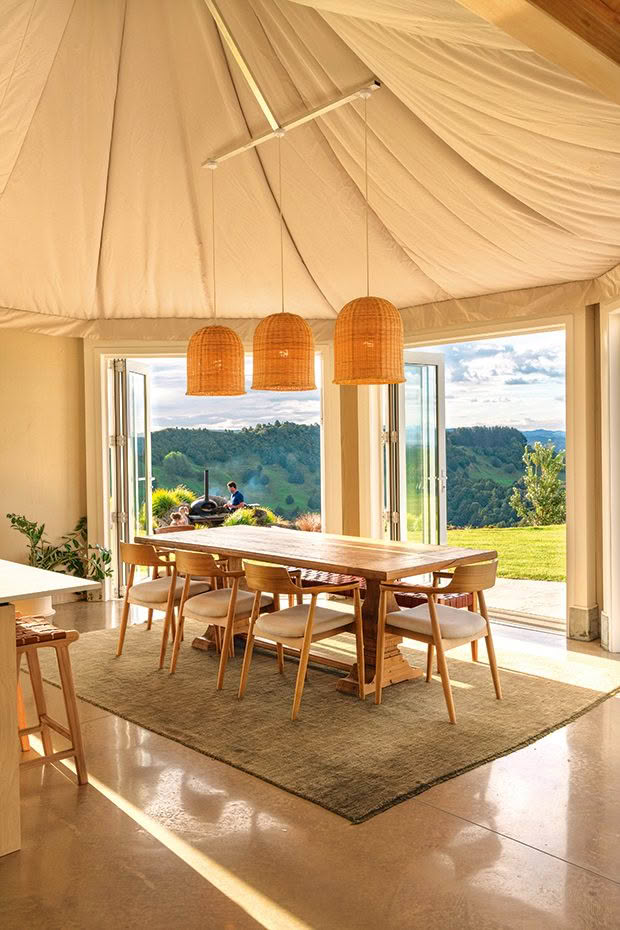
Before building their second site, Emily surveyed holidaymakers and found that while there were many glamping spots made for singles and couples, there was a demand for options to sleep more guests to stay with friends and family. The Pōhutukawa tent accommodates eight comfortably — all of whom can sit around the large dining table inside.
The economic prospect may have been grim, but the views were glorious. Weekends working here brought the pair more peace than the city, where they lived in such proximity to their neighbour that they awoke each morning to the chime of an alarm through the wall.
“In hindsight, it was a good thing,” says Emily. “We spent a lot of time in Waitomo, and it was so peaceful. Having grown up here, Ben’s used to it, but the scenery is amazing.”
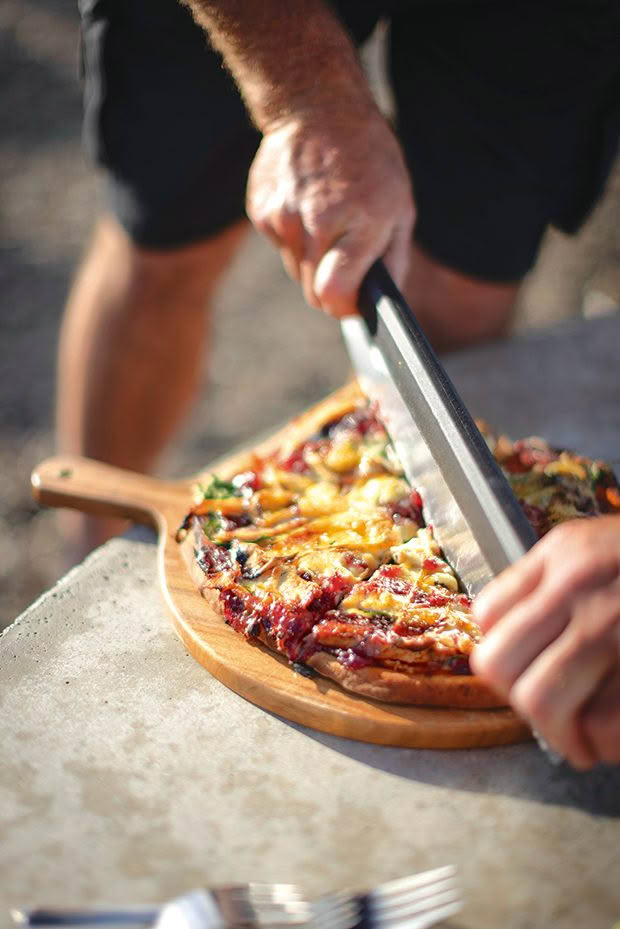
Keen cooks can whip up homemade pizzas for dinner in the outdoor pizza oven.
Stress marked their life in Auckland. Emily owned a furniture business and was nearing the bar exam for her law degree, while Ben was a project manager for Fletcher Construction. Seven-day work weeks were common, and Ben’s phone, according to his wife, would ring non-stop.
“At 3am, they’d ring Ben with a maths problem from site, asking, ‘Can I drive over this bridge with my 12-tonne truck?’ And Ben would be in bed calculating, ‘Hang on, yes, the bridge should be able to hold that’. Then he’d go back to sleep.”
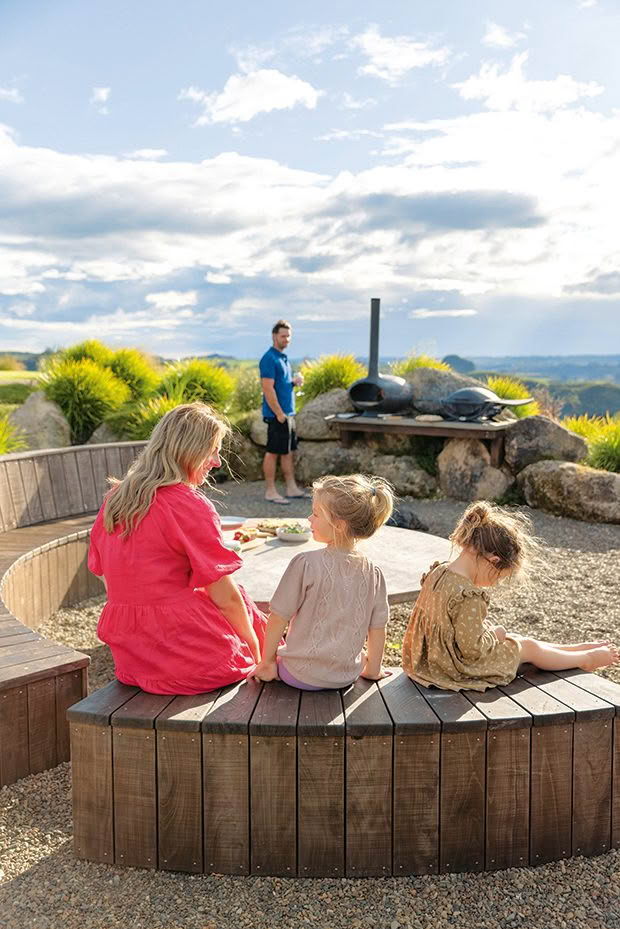
A custom outdoor dining space has arguably the best views of any restaurant in the area.
Says Ben: “You’re stressed, the people above you are stressed, their managers are stressed, and that’s the career path you’re looking at. When I arrived here, this weight lifted off my shoulders. It appealed to me more being on the land, and outside, and not having many people wanting my attention.”
They were newly married, when the decision to give it a proper go on the family farm was sealed. Ben’s father’s farm worker moved on, and help was required. The move came with a few shocks. Emily had passed the bar exam and was in the final stages of selling her small furniture business. She suddenly found herself working with no internet or phone reception. “We had moved in the middle of winter into an old farmhouse and it was freezing. I was still working at the time and wondering, ‘What have I done?’”
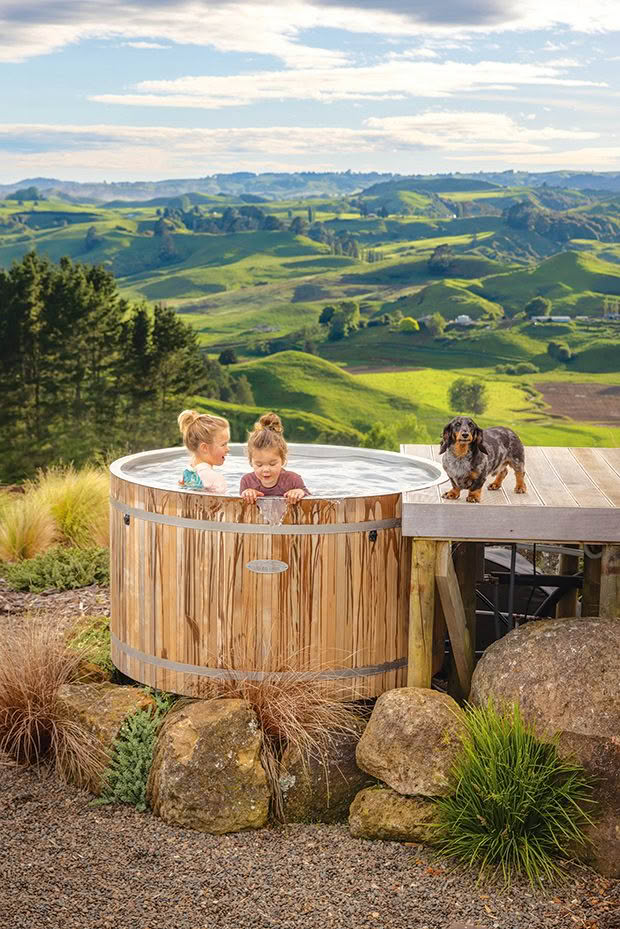
Willow and River enjoy the spa, which is heated via an automated and renewable wood pellet system. “Because people use the spa all the time, after every stay, it gets completely dumped and scrubbed and filled back up — we can have it at 38 degrees Celsius before the next guest arrives.”
While “glamping” is now part of the agritourism lexicon, in those days, it was still a novel concept. The couple came across it when they took a glamping-style holiday. “It was much more low-key than ours — more like camping — and it was so relaxed.” It spurred an idea. Emily didn’t fancy working as a lawyer in a small country town. Was hosting guests on their picturesque chunk of land the answer to filling her days?
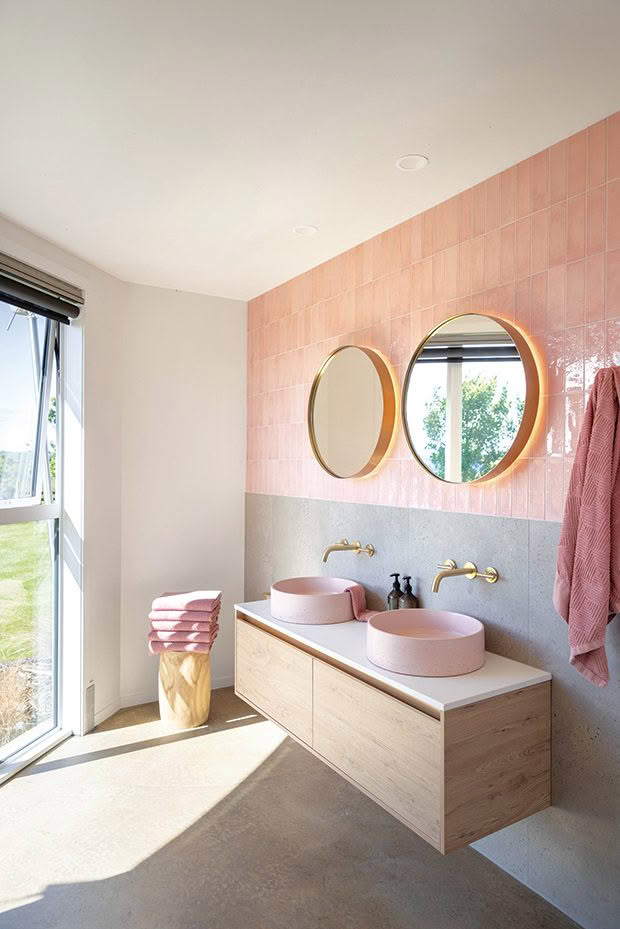
In 2016, the couple sought planning permission for Waitomo Hilltop Glamping from a somewhat-confused local council. “So, it’s a tent?” they were continually asked. Sure — at first. Ben originally planned to “scrape a bit of dirt off the hill and put up a tent.”
“Maybe with a few fold-out chairs.”
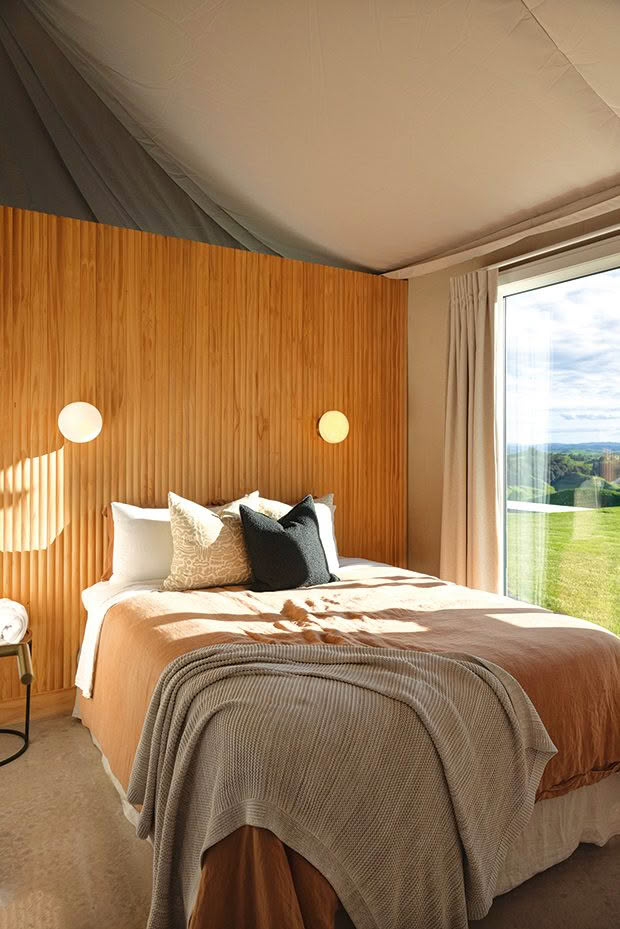
A fraught eight-month delay meant that when the two-person canvas tent they had bought online from South Africa finally arrived in Waitomo, the site they had planned to put it on had grown a little larger. “While we were waiting for the tent to arrive, we had all this time, so my dad and I just kept doing stuff up there when we could fit it in. It ended up being much fancier by accident,” says Ben.
Ben’s father Ken, a clever fixer-upper, kept making the project “bigger and better”. “Like the bath; we thought it would be shoved on the grass, but we got there one day, and he’s building this overhanging platform. And another day, we came up, and he’d built the giant gates. He’s just a handy sort of guy.”
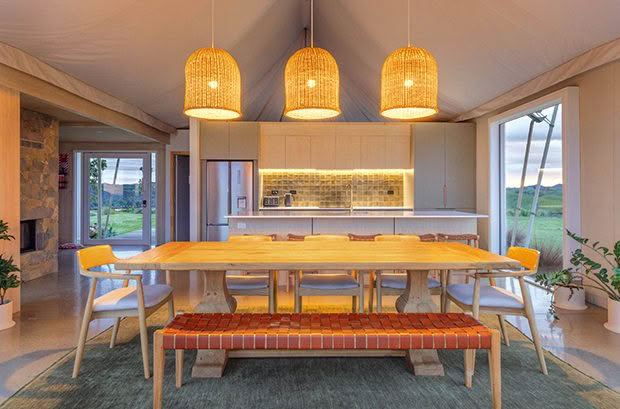
Emily credits Designwell’s Jacki Welten with the tent’s warm and colourful interior fit-out. “She suggested a few things — like the pink bathroom — which we wondered might be too far for us. But we trusted her, and now we just love it.”
The site’s completion was partly paid for by the slightly overwhelming figure of more than 100 pre-booked nights, snapped up when they opened their website for business long before they finished setting up. Emily didn’t fret until one day, watching her husband and father-in-law sweating over a retaining wall in the hot sun, she panicked: What if nobody comes? “The money is one thing, but I’d have wasted an entire year of them building this site, out there in all weather.”
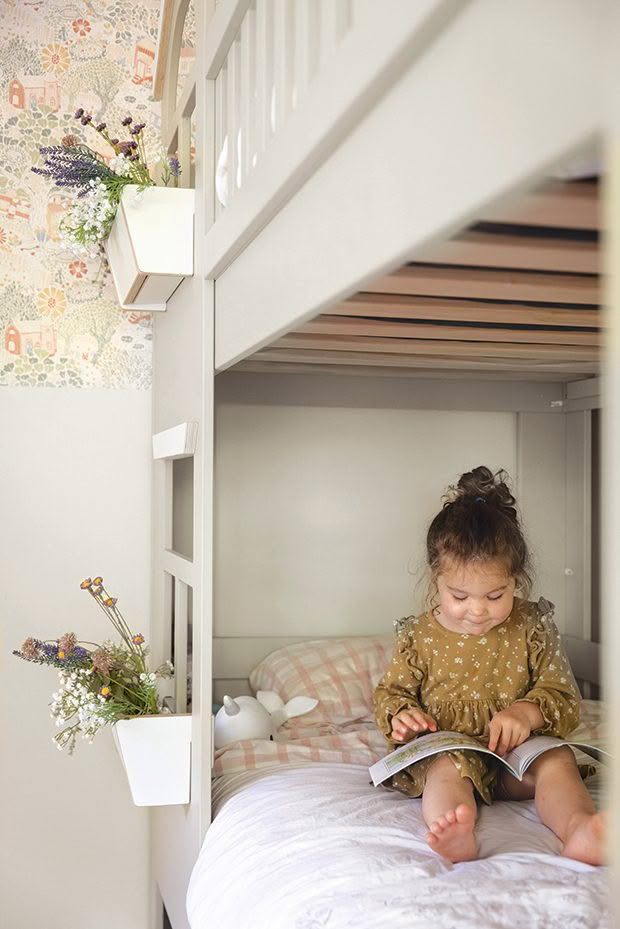
But build it, and they will come. A full year of work later, opening week was marked by a VIP visitor. “It was a Wednesday night, and our first guest was coming on Friday. We hadn’t stayed in the tent yet because it wasn’t ready. We thought we’d have the Thursday in it to ensure everything works.
“Then I got an email from Rachel Hunter, asking to come stay.”
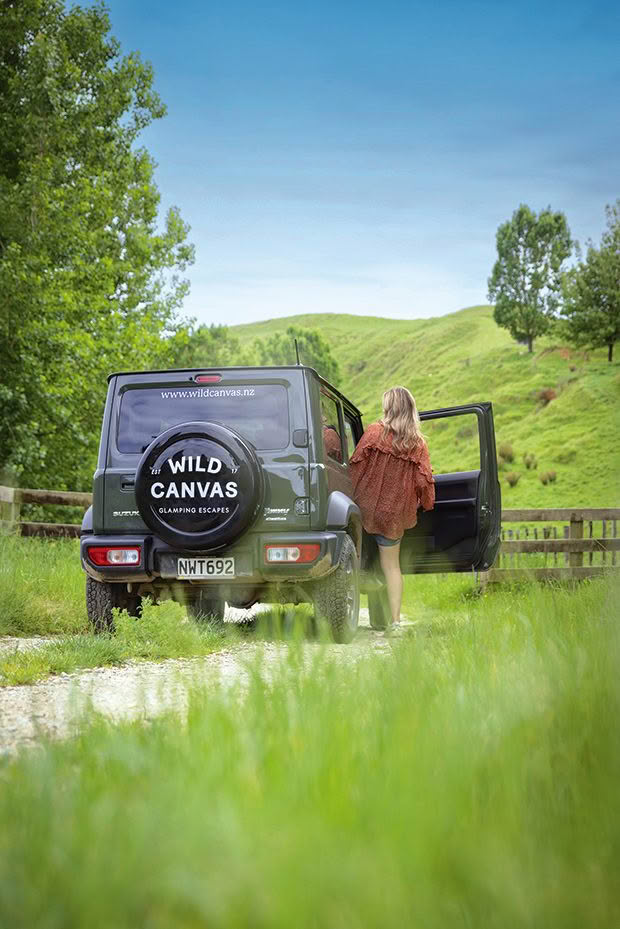
Plans were thrown out the window as the couple — and Ben’s parents — toiled to get the tent supermodel-ready. “We were sweating right up until the minute she came. We had a photo taken with her, and we did not look good. I mean, not that we’d have looked good next to Rachel Hunter anyway.”
The couple informed the New Zealand model and actress that they hadn’t stayed in the tent themselves and to let them know if anything wasn’t up to scratch.
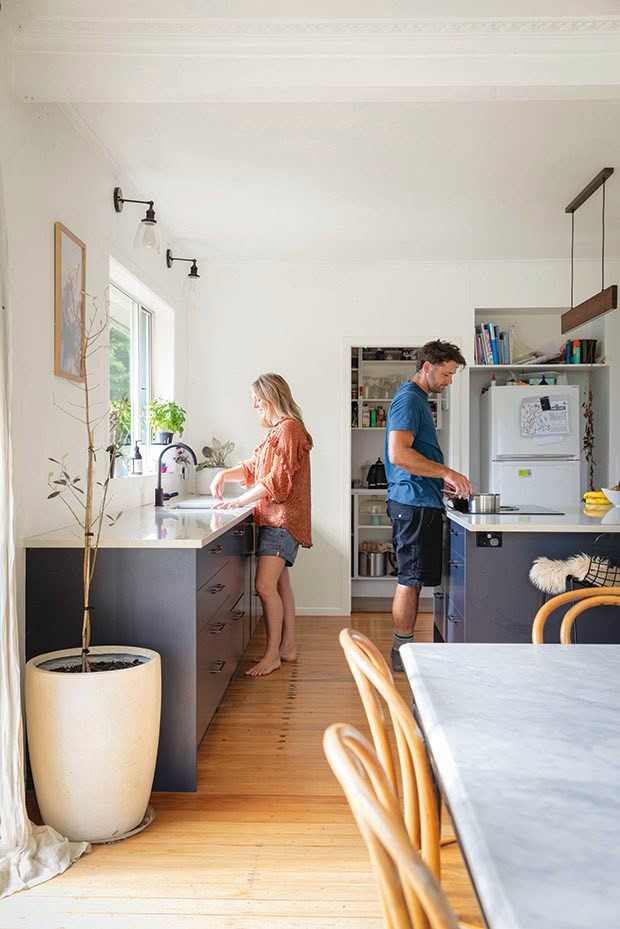
The couple turned their once “freezing” farmhouse into a light and bright family home. Working with interior designer Jacki on the Pōhutukawa glampsite has given Emily the bravery to use more colour in her own home. “When we renovated this place, I made everything white and boring. But working with Jacki and having kids has made me less afraid of colour.”
“The next morning, we picked her up, and she said everything was great. Then a minute later said, ‘Oh, now I think about it, there was no hot water.’ But she was so relaxed about it.”
Thankfully, only a switch needed to be flicked. A week later, the glampsite was on the front page of the Waitako Times, and their Facebook page had 14,000 fans. “It was a pretty good opening”.
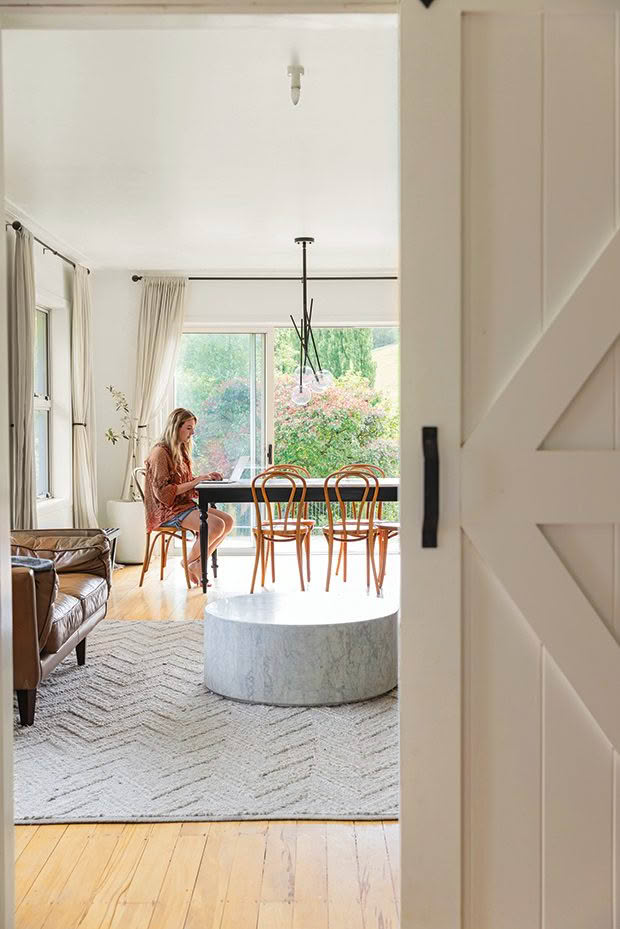
Five years passed before the couple began working on their next site, which opened in 2023, this time with two children — Willow (now 5) and River (now 3) — in tow. Ben, “for some reason”, also completed an MBA.
The larger glampsite resulted from one of his university group assignments, which asked students to expand conceptually on a small business. What could better than the one on Ben’s own block? A group of brains concluded this tent needed to be scaled up to create more revenue. It wasn’t just on paper that the assignment passed. “I was looking at the numbers thinking, hey, this actually looks good,” says Ben.
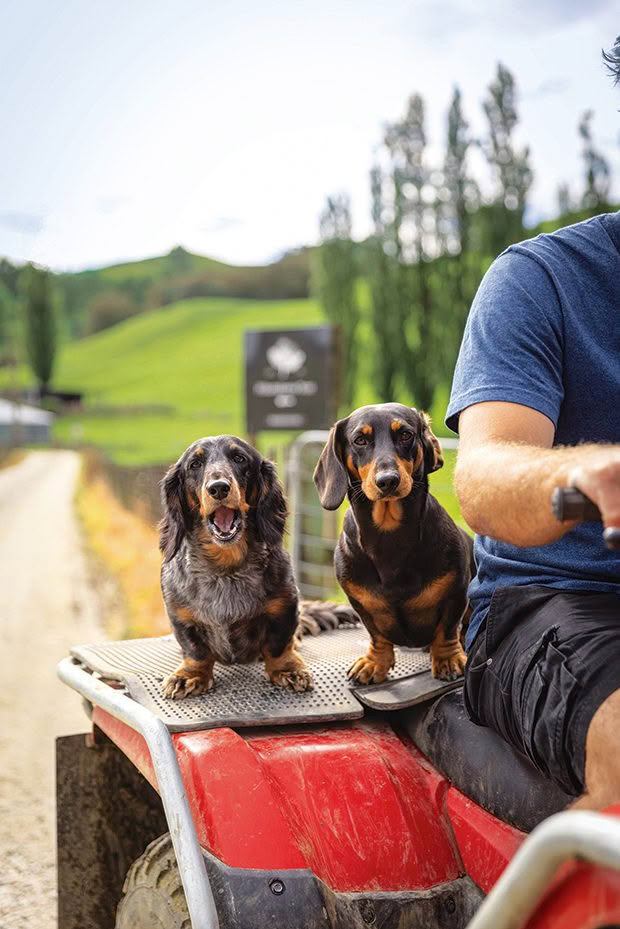
Dachshunds Ralph and Bowie aren’t your average farm dogs, but they like the views from the quad bike just fine, thanks very much.
This time around, the numbers were on point. Newly rebranded, Wild Canvas now has two glampsites, with the recently opened Pōhutukawa tent an elaborate creation. “Tent” is an almost laughable term for the accommodation, which has four bedrooms, two bathrooms, a fully functioning kitchen, a spa and an outdoor pizza oven. It recently picked up Airbnb’s gong for Best Designed Stay, something the couple credits primarily to Waikato-based design studio Designwell, which “took the shapes we played around with” and turned it into an aesthetic two-tent structure, connected by a corridor, housing a large open living area and a fireplace built from local stone.
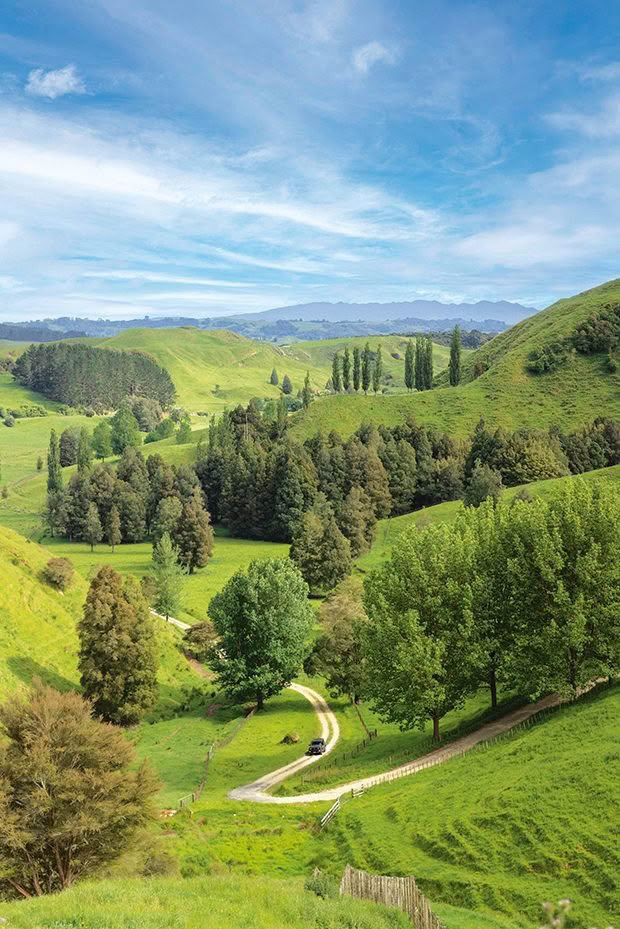
Safeguarding the land is crucially important to the couple. Ben works alongside the catchment group Waipa Rivercare. “They supply native trees and I go around fencing off and restoring kahikatea stands and native bush.” An excited local spotted a rare black mairi (Nestegis cunninghamii) tree on the farm and the couple now provide seeds to local nurseries.
This wasn’t easy. “A lot of houses have two structures connected by a glass corridor. So to me, it was easy: two tents with a glass corridor,” says Emily. “It turned out it wasn’t easy. We had to have months of meetings with engineers to figure out how that middle column would support the tent sides.”
The design wasn’t the only escalation. Much like the cost of a herd years ago, the Pōhutukawa tent budget was “a bit of a blowout”. “It was so stressful,” says Emily. “Budget always goes in any build, but because of Covid-19, every cost skyrocketed.”
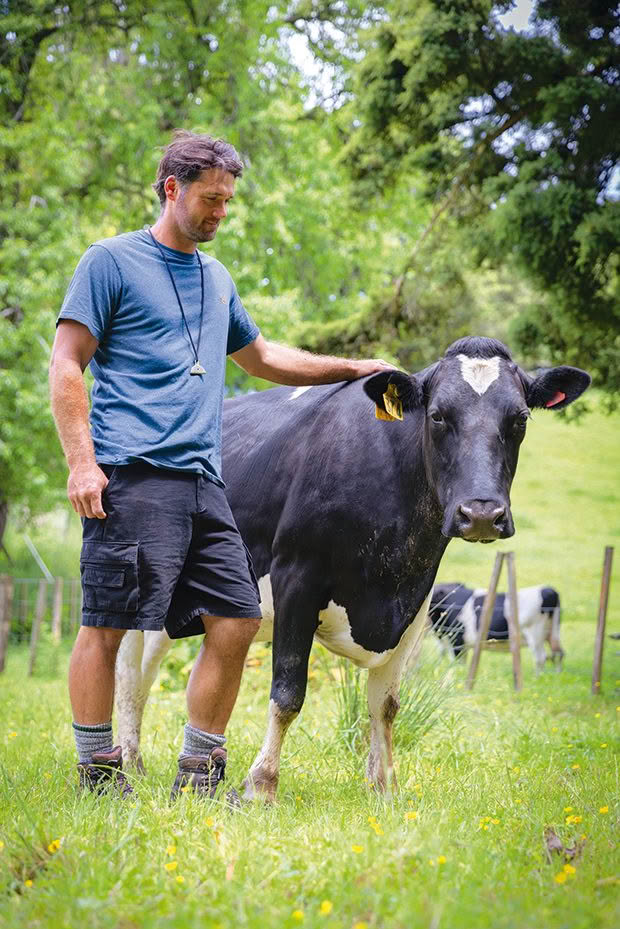
The design had been priced before the world’s pandemic pause. When the time came to build it, construction costs had increased by more than 35 per cent. “We’re trying to lock in the prices of the big items, but all the other small stuff got increasingly expensive. You’re $100,000 over a couple of years later.”
Family was called upon, Ken again on the tools, steering a digger during six weeks of land levelling. His wife Lenise wrangled childcare. Ben’s sister mulched for hours. From overseas, Emily’s brother designed the standout fireplace, while Ben’s brother-in-law built it. Emily’s parents arrived from Britain a month before the site’s opening to visit their grandchildren and were directed straight into the garden to weed.
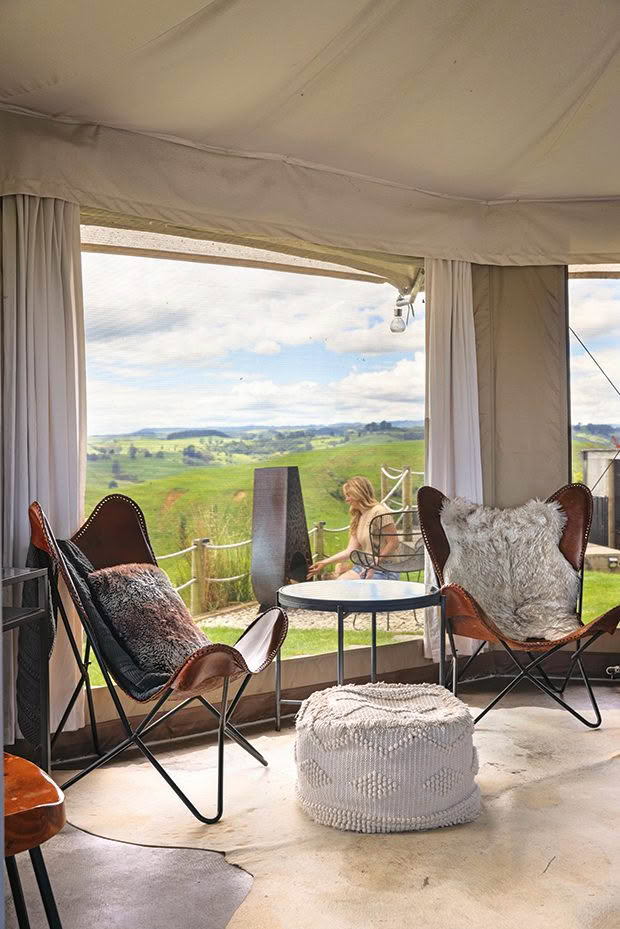
“We’re the face of it, but honestly, we had a lot of help. And a lot of farming probably didn’t happen during that time.”
These days, Ben is “just the handyman” and credits Emily with most of the glamping grunt work. “My engineering contract finishes when the build is complete; now, I’m mowing lawns and fixing pipes. Although there’s a bit of upkeep checking the pumps — there are about eight of them up there, and if one goes down, it’s a bit of a disaster. “But we’ve become good at fixing and replacing things in the four-hour turnover between guests. So, they hopefully don’t know anything about it.”
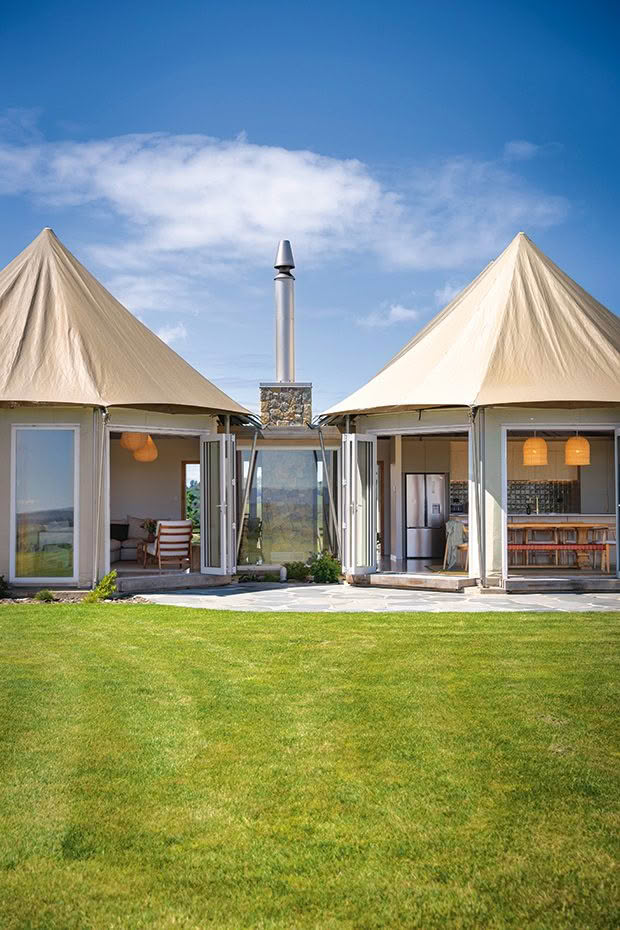
The two tent structures are connected by a glass corridor, which plays home to a custom hand-built stone fireplace, allowing the accommodation to be as cosy in winter as it is airy in summer. Emily’s crack caretaking duo, Dasha Wallace and Shantelle Morrissey, get the sites spick and span between guests.
While Emily restocks S’mores (chocolate and marshmallow) kits and gets guests settled comfortably, Ben remedies months spent on site by keeping busy on the farm with his growing multiplication of cows. Ten years on, the number has again blown out — this time to about 500.
MAKING MEMORABLE MOMENTS
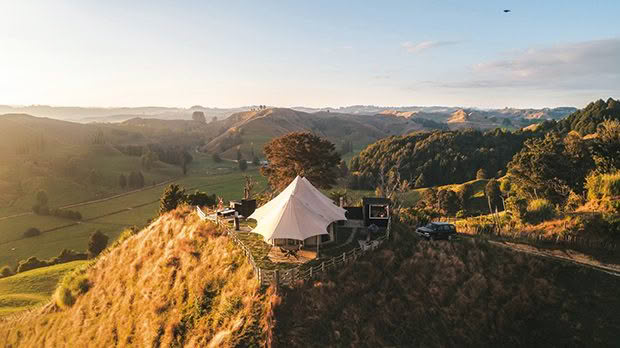
Couples seeking a romantic escape can stay in the Kōwhai tent, the original glampsite. Model and actress Rachel Hunter was the first guest. With no electricity in this spot, the water in the bathroom, kitchen and outdoor baths are heated by gas, as is the Weber barbecue. A woodfired pizza oven provides sustenance, and small power packs are provided to charge devices.
Emily often oversees guests’ most important life moments. Wild Canvas has been the site of proposals, elopements and honeymoons. This means that she can summon photographers, celebrants and private chefs — often without much notice.
Ben’s role as a handyman has also come into play. On one occasion, he whipped up a “pretty basic” wedding arch in an afternoon.
The pair share their top tips for making guests feel welcome on arrival and ensuring things go off without a hitch.
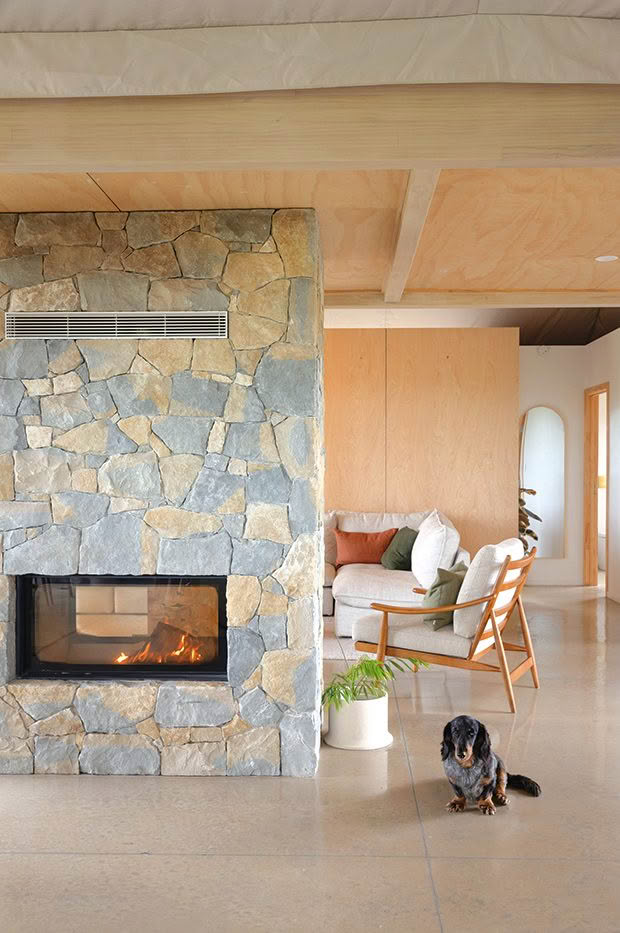
Personalised welcome card/message: Craft a personalised welcome card to create a warm and inviting atmosphere. It’s a simple yet effective way to make guests feel special and appreciated.
Well-supplied: Strive to provide everything guests need for a pleasant stay, reducing the need to pack much. Be generous with what you give, even if this means increasing the nightly rate.
Small touches: Incorporate small thoughtful touches like fresh flowers, S’mores kits, bathroom products, candles, and so on. These seemingly minor details can significantly enhance the overall impression of guests’ stays, creating lasting memories.
Detailed instructions: Offer clear and detailed instructions. Providing information about the accommodation, amenities and local attractions helps guests feel well-informed. This transparency contributes to a positive and stress-free experience.
Event planning tips for special occasions: Working alongside a talented team of vendors is a key aspect. Swift problem-solving is vital for addressing unexpected challenges that may arise on the day.
Actively listening to guests’ needs is foundational, ensuring every detail aligns with their expectations. Lastly, focusing on what matters most for each guest is essential, tailoring the event experience to meet their specific desires and create a truly memorable occasion.
Love this story? Subscribe now!
 This article first appeared in NZ Life & Leisure Magazine.
This article first appeared in NZ Life & Leisure Magazine.
